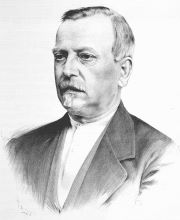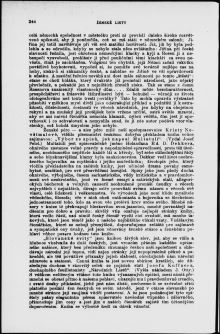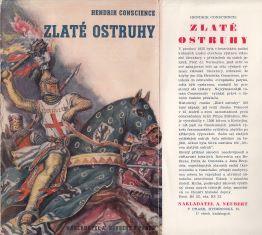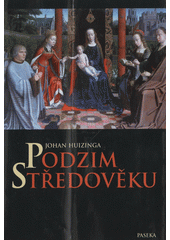Non-Translations

Jakub Malý (1882)
From the 16th to the 19th century, Czech was not a language in which many literary works were written. Thanks to the ‘rebirth’ between c1780 and 1830, more and more literary works began to be published in Czech during the 19th century. Translations of foreign literature were considered by Josef Jungmann (1773-1847), the forerunner of this rebirth, as a good way of enriching Czech.
In the 1830s, this led to a discussion on how to translate: should the translation be as precise as possible in order to make clear that it was a foreign literary work, or should the translation be adapted as much as possible to the Czech culture (with the enrichment of the Czech language in mind)? Furthermore, since the 1840s there were discussions about the admissibility of translations through an intermediate language. The discussion was more or less settled by Jakub Malý (1811-1885), who stated in an article in 1855 that 'high literature' must be translated directly from the source language, but that ‘low-brow’ literature may be translated via another language and may be adapted. This is still the norm in the Czech Republic today and it had quite far-reaching consequences.
What are non-translations?
Because of the Czech translation norms, several 'non-translations' existed. These are literary works of which the Czech literature-loving public was aware (often thanks to existing German translations), but which were not translated because of the norm that such a work should only be translated directly from Dutch. Three important examples are Max Havelaar by Multatuli (Eduard Douwes Dekker), Hendrik Conscience’s De Leeuw van Vlaenderen (The Lion of Flanders) and Johan Huizinga’s Herfsttij der Middeleeuwen (The Waning of the Middle Ages).
Max Havelaar

Review in the Ženské listy of the anthology Výbor ze spisů, jež napsal Multatuli (1903).
As Jaap Grave (2001, 116) has noted, the reception of the novel Max Havelaar, of de Koffijveiligen der Nederlandsche Handel-Maatschappij (1861; Max Havelaar, or the coffe auctions of the Dutch Trading Company) in other languages has been largely through the 1900 German translation by Wilhelm Spohr (1868-1959). This was not the first translation into German, but it was the most influential one. The German translation was immediately reviewed by the influential progressive Czech critic František Václav Krejčí (1867-1941) in the journal Rozhledy, who also indicated that this journal was planning to print translations from Multatuli's works.
That indeed happened. In addition, 1903 and 1911 saw the publication of anthologies of Multatuli's works by the feminist and translator Krista Nevšimalová née Goldmannová (1854-1935), probably based on German translations. Her translation was discussed not only in the regular newpapers and progressive literary periodicals but as well by her friend, the most important Czech feminist writer Eliška Krásnohorská-Pechová in het feminist monthly Ženské listy (Women's Newspaper). The reason was his very progressive ideas about female emancipation.
Dozens of smaller translations, mainly from his Ideen (Ideas), were published in various mainly socialist journals. Multatuli was even quoted in the budget debates in the Czech parliament in 1919. But a complete translation of his most important work, the Max Havelaar, failed to materialize, even when the necessity of such a translation was several times mentioned in the press.
It was only in 1947 that the newly founded publishing house of the Communist Party KSČ, Svoboda, published a complete translation of the Max Havelaar as the first volume of a new prestigious series Klasikové (Classics). This translation was made during the Second World War by Rudolf Jordán Vonka (1877-1964), who had already made his name before the war as the translator of the Flemish author Felix Timmermans. His translation was rather an adaptation but it was very successful. In 1974, the same publishing house published another complete Max Havelaar, this time in a new and accurate translation by Miroslav Drápal (1916-1991). Thanks to the fact that Vonka and Drápal were able to translate directly from Dutch, Czech standards were met.
De Leeuw van Vlaenderen (The Lion of Flanders)

Dusk jacket of the 1936 Czech translation of Conscience's novel De Leeuw van Vlaenderen
As in almost all Central European countries, the oldest literary translations into Czech and the vast majority of translations from Dutch in the 19th century are translations of works by the popular Flemish writer Hendrik Conscience (1812-1883). There are 43 known Czech translations in the period 1846-1918, which corresponds to about 40% of his works and 42.5% of all translations from Dutch into Czech during that period (Engelbrecht 2016, 171). After World War I, almost nothing of Conscience’s work was translated; it had become obsolete.
It is remarkable that his best-known work, De Leeuw van Vlaenderen (1838, The Lion of Flanders), was not translated during the 19th century. Of his other larger novels, only De boerenkryg (1853, The Peasants’ War) and In 't wonderjaer 1566 (1837, The Miracle Year 1566) were translated, the first in 1881 by an otherwise unknown J.P. Lhotecký, who translated many of Conscience's works through French translations, the second in 1884 by the high school director and professor of German Václav Petrů (1841-1906). Conscience's novels were mostly published in cheap series for workers and peasants, so it is clear that his work was mainly considered as 'zábavná literatura', entertainment literature (Engelbrecht 2013).
Petrů intended to translate The Lion of Flanders in the series Klasy (Ears of Wheat), but due to the premature death of publisher Vendelín Steinhauser, with whom he worked, it did not happen. De Leeuw was finally translated three times in the 1930s. Two translations appeared in magazine form, the first in 1932 as a novel supplement of the popular newspaper Polední ostravský deník (Noon Ostrava Daily) by Karel Cepek, an otherwise unknown translator. The second in 1935, also as a novel supplement of the Catholic newspaper Lidové listy (People's Newspaper), was translated by Jaroslav J. Svoboda (1894-1944), a well-known translator of mainly English novels. It is doubtful whether both translations were made from Dutch; both translators probably used existing German translations. In 1936, however, a new translation in book form was published by the Prague publishing house Neubert, written by the priest Antonín Číhal (1881-1940), who did translate directly from Dutch. Číhal was, among other things, a foreign correspondent for the Dutch Catholic press and knew the language well.
There were two reasons why De Leeuw was only now published in Czech translation. First, in the period when Conscience was really popular, there were hardly any translators available with an active knowledge of Dutch, so his works, classified as 'literary', could not be translated directly from the source language. Secondly, the increasing political threat of Nazi Germany against Czechoslovakia made this very novel suddenly topical - and at that moment there was a translator available who was able to translate it directly.
Herfsttij der Middeleeuwen (The Waning of the Middle Ages)

The 2nd edition (2010) of the Czech translation of Huizinga's Herfsttij der middeleeuwen
The last example of non-translations due to a lack of competent translators is the Herfsttij der Middeleeuwen (1919, The Waning of the Middle Ages) by the internationally known scholar and historian Johan Huizinga (1872-1945). Huizinga gained international fame precisely with this book. Czech historians became acquainted with the book in 1926 through the German translation, which was extensively discussed in Czech historical magazines. In 1939 the prominent Czech historians Josef Šusta (1874-1945) and Bedřich Mendl (1892-1940), who like Huizinga belonged to the Annals School, considered starting a historical series at the well-known cooperative publishing house Družstevní práce (Cooperative Labour), but due to the outbreak of the Second Worldwar work on the series was stopped.
After the Communist takeover in 1948, a translation of Herfsttij der Middeleeuwen, which had meanwhile become an international bestseller, was no longer opportune. This changed with the so-called Prague Spring in 1968, when for a while it looked as if a 'third Czechoslovak road' would emerge. In this period, Huizinga's Homo ludens (1938) was translated into Czech, incidentally via the German translation. However, before a translation of the much larger work Herfsttij could be made, the Prague Spring was already over. Finally, after the fall of the Wall in 1999, the work was published in a quality translation through German. This translation was republished in a revised edition in 2010. Since the work was primarily classified as historical professional literature, it was not deemed necessary to translate it from the source language. Huizinga’s essayistic biography of Erasmus (1924) was published in 2014 in the leading philosophical series OIKOYMENH in a translation made directly from Dutch.
References
Engelbrecht, Wilken (2021). Van Siska van Rosemael tot Max Havelaar. Nederlandstalige literatuur in Tsjechische vertaling tussen 1848 en 1948. Gent: Academia Press, pp. 164-171 (Faltová) and 253-254 (Kazdová).
Grave, Jaap (2001). Zulk vertalen is een werk van liefde. Bemiddelaars van Nederlandstalige literatuur in Duitsland 1890-1914. Nijmegen: Vantilt.
K (=Krejčí, František V.) (1900). “Multatuli”. Rozhledy 9, no. 9, pp. 185-190.
